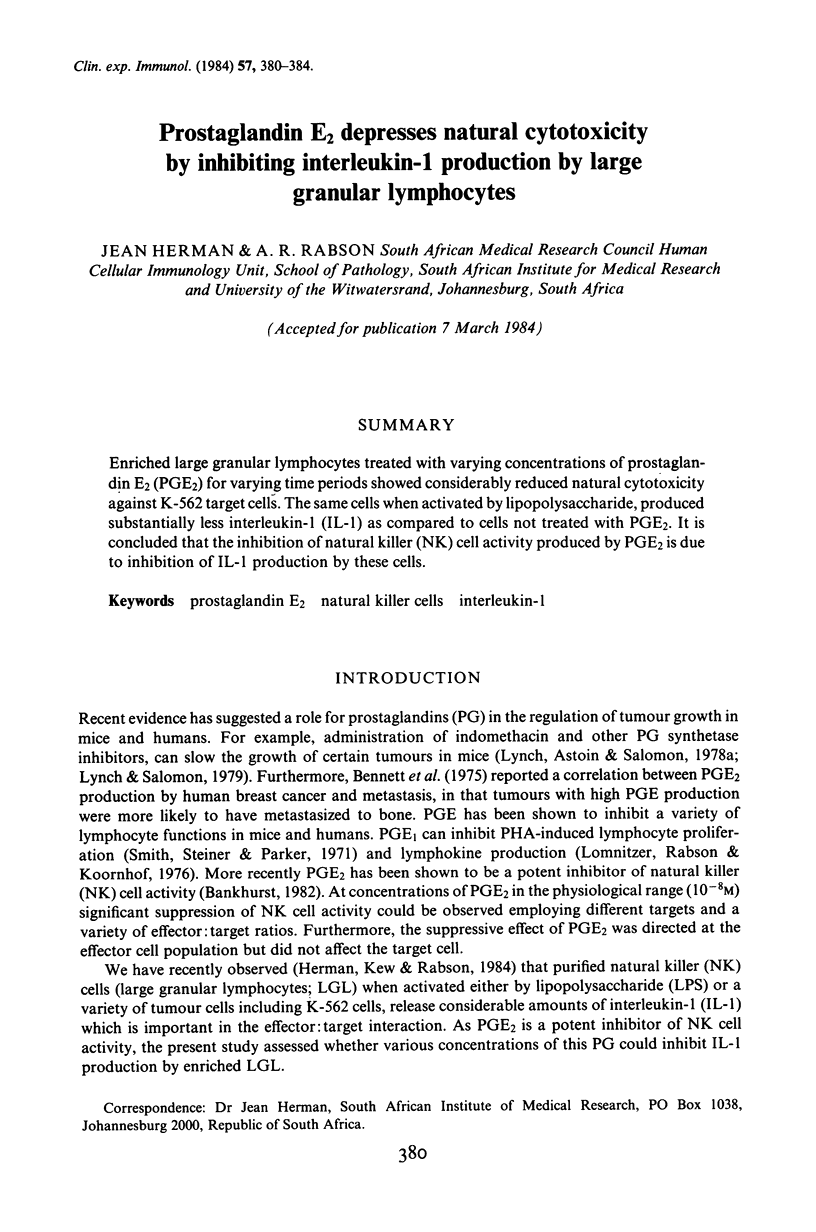Abstract
Enriched large granular lymphocytes treated with varying concentrations of prostaglandin E2 (PGE2) for varying time periods showed considerably reduced natural cytotoxicity against K-562 target cells. The same cells when activated by lipopolysaccharide, produced substantially less interleukin-1 (IL-1) as compared to cells not treated with PGE2. It is concluded that the inhibition of natural killer (NK) cell activity produced by PGE2 is due to inhibition of IL-1 production by these cells.
Full text
PDF




Selected References
These references are in PubMed. This may not be the complete list of references from this article.
- Bankhurst A. D. The modulation of human natural killer cell activity by prostaglandins. J Clin Lab Immunol. 1982 Feb;7(2):85–91. [PubMed] [Google Scholar]
- Bennett A., McDonald A. M., Simpson J. S., Stamford I. F. Breast cancer, prostaglandins, and bone metastases. Lancet. 1975 May 31;1(7918):1218–1220. doi: 10.1016/s0140-6736(75)92197-2. [DOI] [PubMed] [Google Scholar]
- Bennett A., Tacca M. D., Stamford I. F., Zebro T. Prostaglandins from tumours of human large bowel. Br J Cancer. 1977 Jun;35(6):881–884. doi: 10.1038/bjc.1977.132. [DOI] [PMC free article] [PubMed] [Google Scholar]
- Brunda M. J., Herberman R. B., Holden H. T. Inhibition of murine natural killer cell activity by prostaglandins. J Immunol. 1980 Jun;124(6):2682–2687. [PubMed] [Google Scholar]
- Droller M. J., Schneider M. U., Perlmann P. A possible role of prostaglandins in the inhibition of natural and antibody-dependent cell-mediated cytotoxicity against tumor cells. Cell Immunol. 1978 Aug;39(1):165–177. doi: 10.1016/0008-8749(78)90091-6. [DOI] [PubMed] [Google Scholar]
- Lomnitzer R., Rabson A. R., Koornhof H. J. The effects of cyclic AMP on leucocyte inhibitory factor (LIF) production and on the inhibition of leucocyte migration. Clin Exp Immunol. 1976 Apr;24(1):42–48. [PMC free article] [PubMed] [Google Scholar]
- Lynch N. R., Castes M., Astoin M., Salomon J. C. Mechanism of inhibition of tumour growth by aspirin and indomethacin. Br J Cancer. 1978 Oct;38(4):503–512. doi: 10.1038/bjc.1978.237. [DOI] [PMC free article] [PubMed] [Google Scholar]
- Lynch N. R., Salomon J. C. Tumor growth inhibition and potentiation of immunotherapy by indomethacin in mice. J Natl Cancer Inst. 1979 Jan;62(1):117–121. [PubMed] [Google Scholar]
- Oppenheim J. J., Koopman W. J., Wahl L. M., Dougherty S. F. Prostaglandin E2 rather than lymphocyte-activating factor produced by activated human mononuclear cells stimulates increases in murine thymocyte cAMP. Cell Immunol. 1980 Jan;49(1):64–73. doi: 10.1016/0008-8749(80)90056-8. [DOI] [PubMed] [Google Scholar]
- Smith J. W., Steiner A. L., Parker C. W. Human lymphocytic metabolism. Effects of cyclic and noncyclic nucleotides on stimulation by phytohemagglutinin. J Clin Invest. 1971 Feb;50(2):442–448. doi: 10.1172/JCI106511. [DOI] [PMC free article] [PubMed] [Google Scholar]
- Trinchieri G., Santoli D., Granato D., Perussia B. Antagonistic effects of interferons on the cytotoxicity mediated by natural killer cells. Fed Proc. 1981 Oct;40(12):2705–2710. [PubMed] [Google Scholar]


